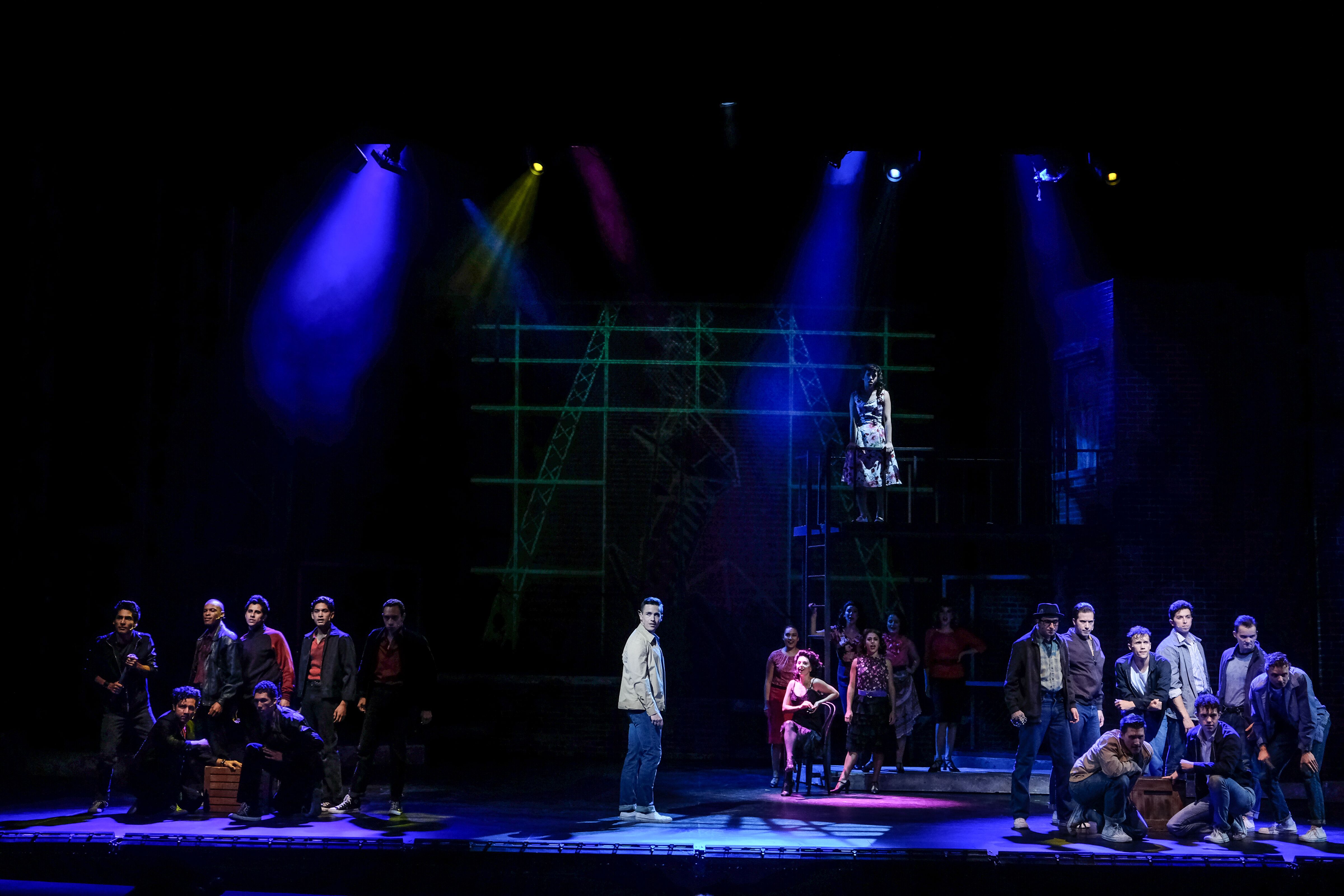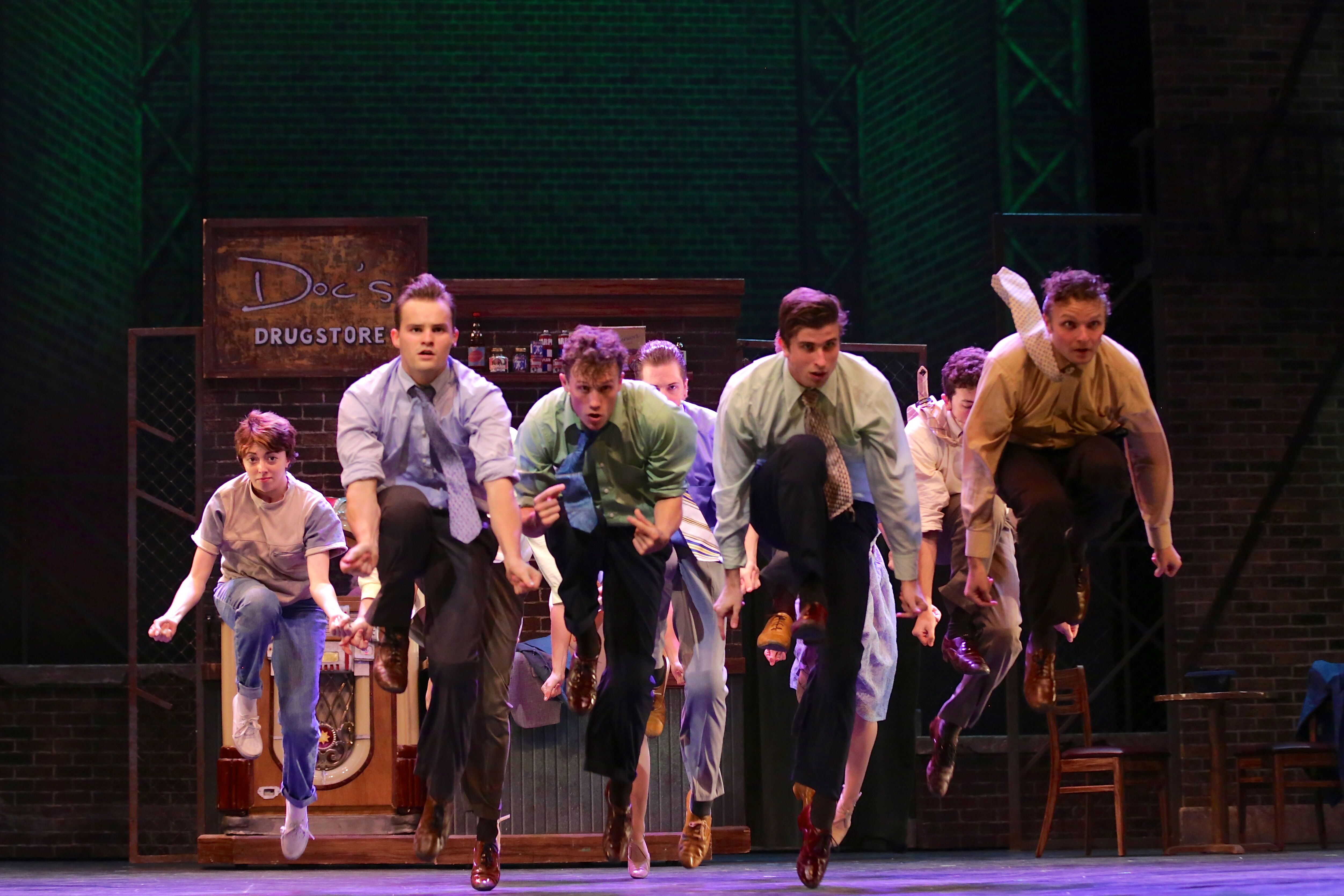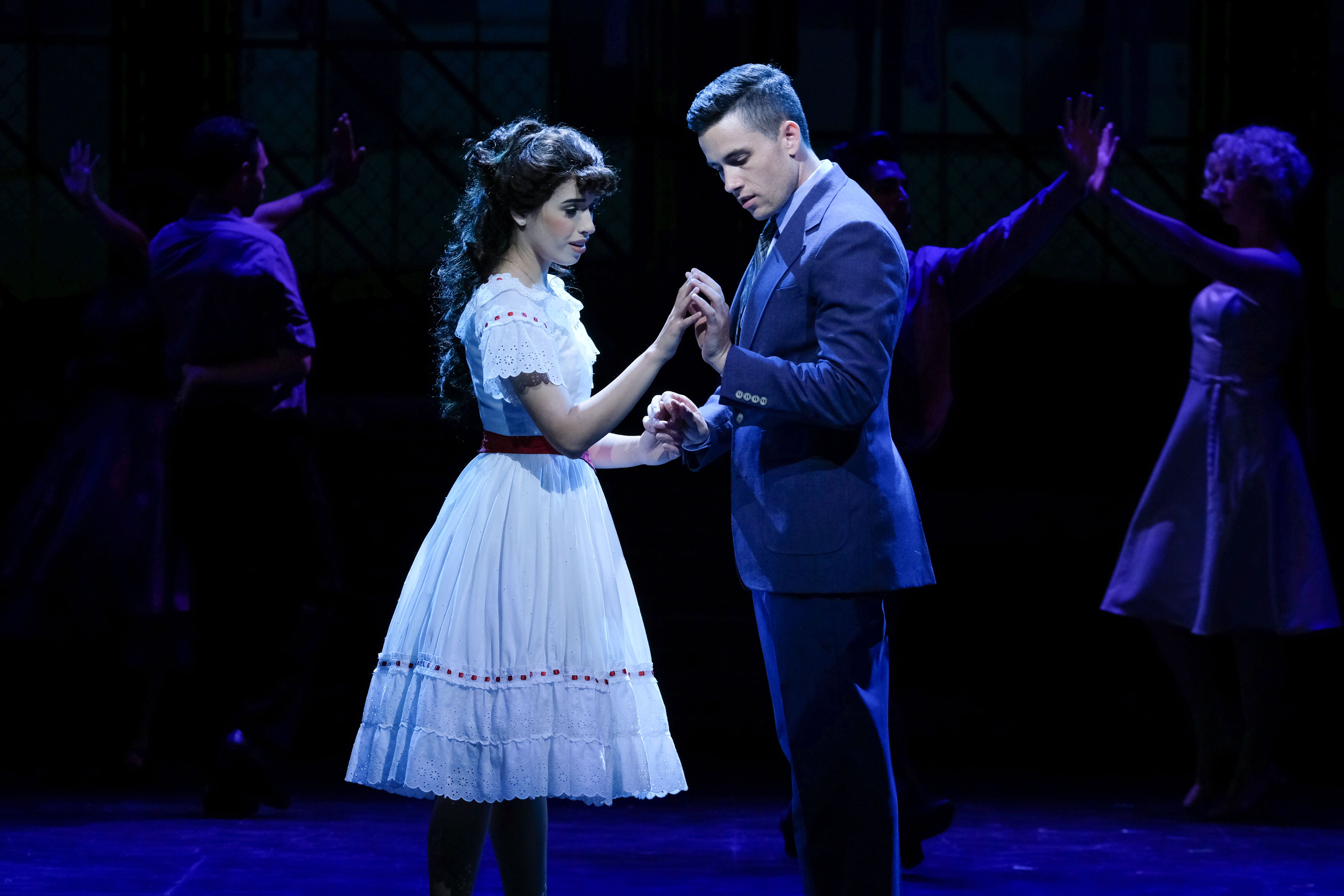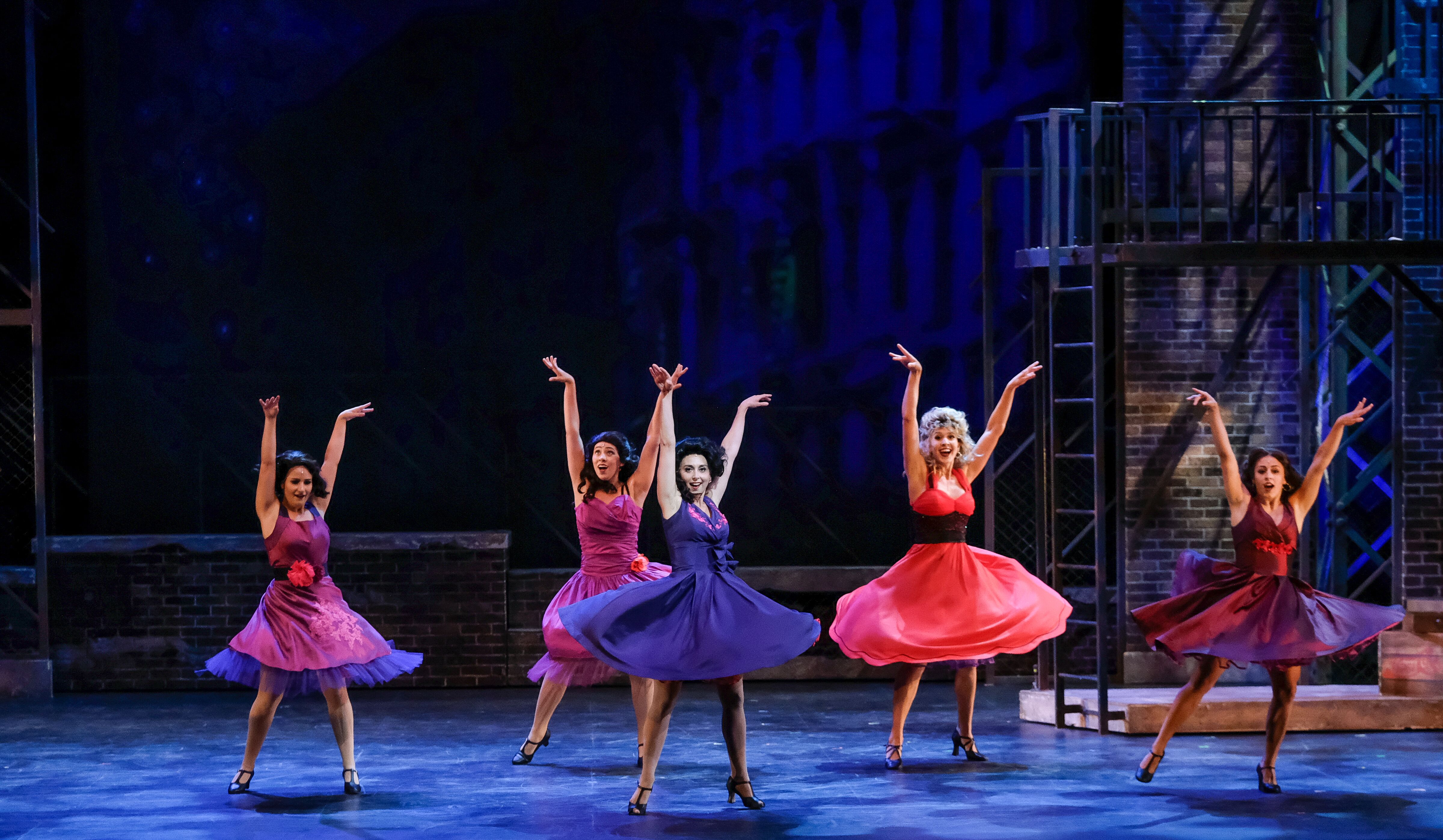Fiery, Authentic Dance Fuels ‘West Side Story’ at Moonlight
There are moments in West Side Story when Jerome Robbins’ choreography is so fiery and authentic we can forget it’s a musical. Young actors snap their fingers and suddenly they’re tough young thugs leaping and sliding, and killing each other.
Robbins broke musical theater traditions when he asked his old collaborator Leonard Bernstein, along with playwright Arthur Laurents and 25-year-old Stephen Sondheim, to reset Shakespeare’s Romeo and Juliet on the streets of New York with warring gangs.

The Jets and The Sharks get ready to rumble in West Side Story at Moonlight Amphitheatre. Image: Ken Jacques
A tragic love story with electrifying dance numbers, West Side Story premiered in 1957 and reflects the racism and violence of the time. As directed by Steven Glaudini for Moonlight Stage Productions in Vista, it survives as an operatic social commentary and plea for tolerance, which feels essential as we continue to struggle with American identity and race, and knowing that Puerto Rico is part of America.
Choreographer Hector Guerero brings every distinctive finger snap and threatening melee from the source. He’s one of two people in the country certified by the Robbins Trust to reproduce the difficult movement. He also retains the poignant dream sequence that is often cut from productions. You may have seen the show before, but it’s danced wonderfully here.

Riff and the Jets in West Side Story at Moonlight Amphitheatre. Image: Adriana Zuniga
West Side Story immerses the audience in clashes between the white Jets gang and Puerto Rican Sharks. Some wear knee pads under their jeans, because their rumble dances are aggressive and emphasize the downbeats. The women egg them on and swish their skirts. There are dozens of dance scenes that include a mambo to Cha-Cha competition, jitterbug, ballet, and high lifts. Robbins’ choreography fuses jazz and ballet to create tension and propel the narrative.

Bella Gil and Michael James Byrne star as Maria and Tony. Image: Ken Jacques
The cast dances around fire escapes and scrambles over chain link fencing. In “Dance at the Gym,” the cast fills the stage with dangerous energy.
A youthful rawness defines this production. Bella Gil makes her Moonlight debut as Maria, and at age 18, brings natural naivety. She hits the high notes and doesn’t hold back when threatening her community with a gun. Michael James Byrne as Tony has an attractive tenor voice. He had a few pitch problems and odd phrasing on opening night that will brighten over the run. The lovers have plenty of dramatic and vocal chemistry, and scamper up and down ladders and into a tiny bed with believable giddiness. Stupid kids. We know how this ends.
Courtney Arango is on fire as Maria’s sister-in-law Anita, dancing with a saucy grittiness that we expect, and she steals the show in “America.” (Film buffs will remember Rita Moreno won an Oscar for playing the role of Anita in the 1961 film. She returns to the screen for a new West Side Story, directed by Steven Spielberg this summer.)
Milan Magana as Rosalia is also appealing when dreaming of her beloved Puerto Rico with no electricity. Her gestures are organic and she’s free to swish her gorgeous natural hair.
The cast looks and sounds authentic, except for a few scraggly wigs.
Conductor Elan McMahan leads the orchestra and actors through “I Feel Pretty” and “A Boy Like That”/”I Have a Love” with zeal and proper tempo. Bernstein’s score and Sondheim’s lyrics make West Side Story an unforgettable musical, but distinctive dance builds extra tension, and an attempted rape scene continues to shock viewers.
West Side Story demands that the cast be skilled actors, singers and dancers. Audiences must consider violence, race, and child abuse.
From the Jets song about Officer Krupke:
“Gee, Officer Krupke, we’re very upset;
We never had the love that ev’ry child oughta get.
We ain’t no delinquents,
We’re misunderstood.
Deep down inside us there is good!
Officer Krupke, you’re really a slob.
This boy don’t need a doctor, just a good honest job.
Society’s played him a terrible trick,
And sociologic’ly he’s sick!”

The girls of the Sharks know how to twirl. Costumes by Dixon Reynolds. Image: Ken Jacques
To help the young cast grow into their roles, it’s said that Robbins would not allow opposite gangs to mix during rehearsals. He planted rumors to incite hatred. His choreography, its arrogance and hope, sharp angles and open chests, is why West Side Story is more than a story. It’s a warning.
The final moments in this tragic story drag on too long. “I can kill now, ‘cause I hate now,” screams Maria. When the bows finally come, viewers aren’t sure how to respond. It feels wrong to applaud. Better to stand for a few moments of silence.
West Side Story runs through Aug. 31, 2019. Moonlight Amphitheatre in Vista.
www.moonlightstage.com 760-724-2110

Kris Eitland covers dance and theater for Sandiegostory.com and freelances for other publications, including the Union Tribune and Dance Teacher Magazine. She grew up performing many dance styles and continued intensive modern dance and choreography at the Univ. of Minnesota, Duluth, and San Diego State Univ. She also holds a journalism degree from SDSU. Her career includes stints in commercial and public radio news production.
Eitland has won numerous Excellence in Journalism awards for criticism and reporting from the San Diego Press Club. She has served on the Press Club board since 2011 and is a past president. She is a co-founder of Sandiegostory.com. She has a passion for the arts, throwing parties with dancing and singing, and cruising the Pacific in her family’s vintage trawler. She trains dogs, skis, and loves seasonal trips to her home state of Minnesota.
